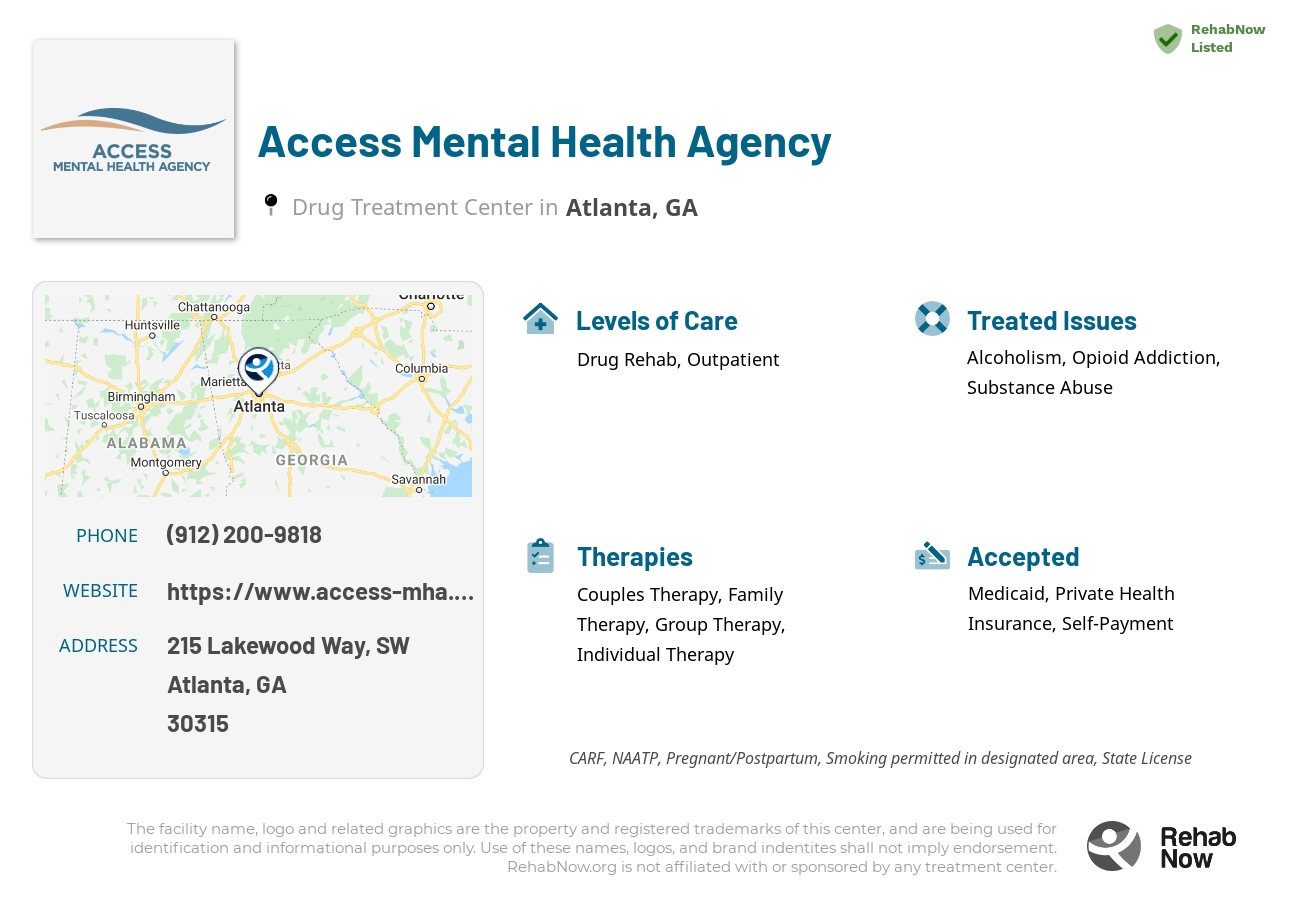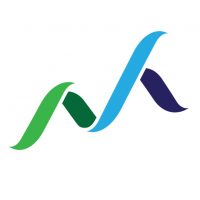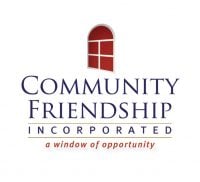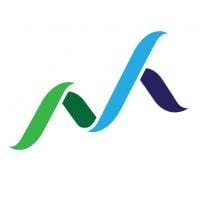
Access Mental Health Agency
Drug Rehab Center in Atlanta, Georgia
- Substance Abuse
- Opioid Addiction
- Drug Addiction
- Alcoholism
Access Mental Health Agency is an outpatient mental health and addiction treatment facility in Atlanta that provides evidence-based treatment plans, holistic therapies, and comprehensive services to individuals and families struggling with addiction, as well as being a certified provider of treatment with a range of specialized services.
About This Georgia Facility
Access Mental Health Agency is an outpatient, mental health and addiction treatment facility located in Atlanta, Georgia. The facility provides support and counseling to individuals and families struggling with various mental health and addiction issues. They specialize in treating co-occurring disorders and provide evidence-based treatment plans tailored to the needs of the individual. They have a highly trained and experienced staff offering individual, group, and family therapy that takes into account the holistic needs of a person.
At Access Mental Health Agency, they understand that treating addiction requires more than just one-on-one counseling sessions. They offer comprehensive services to help individuals struggling with addiction, including 12-step and faith-based support groups, vocational training, relapse prevention, recovery skills training, and education about health and wellness. They also provide medication-assisted treatment and holistic therapies to assist in the recovery process. Additional services such as aftercare planning, community resources and referrals, and peer support are available to ensure continued success and a healthy lifestyle.
Access Mental Health Agency is licensed and accredited by the Joint Commission and the Georgia Department of Behavioral Health, and has also been recognized by the National Association of Addiction Specialists as a certified provider of treatment. They offer a range of unique and specialized services such as virtual therapy and day treatment programming, as well as telehealth services, all of which are designed to assist clients in their recovery journeys. Additionally, Access Mental Health Agency is the first facility in Georgia to be certified as a recovery-friendly workplace, demonstrating their commitment to lifestyle and recovery.
Genders
Ages
Modality
Additional
Conditions and Issues Treated
Substance abuse is defined by the continued use of drugs or alcohol despite negative consequences, such as legal or work problems. It can be treated using a variety of services, including therapy and medication.
Substance abuse treatment is beneficial for:
- People who have been using drugs or alcohol for a long time.
- People who have been using drugs or alcohol to cope with stress, anxiety, or depression.
- People who have a mental health disorder in conjunction with substance abuse.
- People who continue to use drugs or alcohol despite the harmful effects they cause on their own life and the lives of others.
- People who have had multiple failed attempts at recovery without medical assistance.
If you believe that addiction treatment is right for you or a loved one, you can contact your primary care physician, or search for addiction treatment centers in your area. Treatment is beneficial to people who are motivated towards recovery, and who understand the benefits of professional care.
Opioid addiction is the result of repeated use, or abuse, of opioid drugs. It is recommended for people who are dependent on opioids, or who have a high risk for dangerous health concerns, to seek professional treatment. Treatment plans usually include behavioral therapy and medication-assisted treatment.
Opioid drugs include: fentanyl, heroin, methadone, oxycodone, and oxymorphone.
Opioid addiction treatment is beneficial for:
- People who have a history of severe withdrawal.
- People with a high risk for dangerous health concerns.
- People having difficulty overcoming opioid addiction on their own.
Levels of Care Offered at Access Mental Health Agency
This center offers a variety of custom treatment tailored to individual recovery. Currently available are Drug Rehab, Outpatient, with additional therapies available as listed below.
The outpatient programs in Atlanta, GA are for those addicted drugs or alcohol. The goal of the outpatient rehabilitation program is to make them stop abusing drugs or alcohol, reduce drug use or addictive behaviors, and become entirely sober. It is generally required to attend the outpatient program for 10-12 hours every week.
Patients can be administered on-the-spot medication to ease withdrawal symptoms such as anxiety, increased heart rate, and even depression. Groups such as Alcoholics Anonymous (AA) and Narcotics Anonymous (NA) can be used as a part of outpatient treatment to help maintain sobriety.
Therapies & Programs
People in addiction recovery can benefit from individual therapy. This type of therapy involves meeting with a therapist one-on-one. This allows for a personal and trusting relationship to be built so that the patient can be truly themselves and express any emotions they feel. Individual therapy leads to greater understanding and peace about your triggers for addiction and coping strategies to prevent relapse.
Couples therapy for drug addiction is based on the belief that addiction is a family disease. Everyone involved with an addict, not just the addict themselves, is affected by their behavior and the changes the addict goes through. The relationship also changes the addict’s significant other and has likely picked up some codependent behaviors. Codependency is a term used to describe a person obsessed with another person and their needs and feelings while neglecting their own. Addicts are usually people-pleasers, so it is understandable how one can become codependent in relationships with addicts.
Family therapy is a type of group problem-solving that aims to improve communication and relationships between the patient, their family, and sometimes friends. The main goal of family therapy for drug addiction is to create an environment where communication can occur without judgment, hostility, or blame. The therapist is with the family as they learn to communicate with each other differently, especially with the addict when s/he is using.
Group therapy sessions are held in rehab facilities, clinics, churches or community centers that offer drug addiction treatment. People who attend these groups are encouraged to voice their feelings and support other addicts in recovery. This helps group members strengthen their own recovery program while cheering on others who are struggling with sobriety.
Group therapy sessions provide recovering addicts with a chance to cope with everyday situations that many face. Group therapy sessions are held in rehab facilities, clinics, churches or community centers that offer drug addiction treatment.
People who attend these groups are encouraged to voice their feelings and support other addicts in recovery. This helps group members strengthen their own recovery program while cheering on others who are struggling with sobriety.
Cognitive Behavioral Therapy (CBT) helps addicts identify faulty, negative thinking so that they can work together with the therapist to find healthier ways of thinking. CBT focuses on specific aspects of each person’s thinking, feeling, physiology, and behavior. It aims to identify specific problems in these areas, and create a personalized treatment strategy.
Payment Options Accepted
For specific insurance or payment methods please contact us.
Is your insurance accepted?
Ask an expert, call (888) 674-0062
Additional Details
Specifics, location, and helpful extra information.
Atlanta, Georgia 30315 Phone Number(912) 200-9818 Meta DetailsUpdated November 25, 2023
Staff Verified
Patient Reviews
There are no reviews yet. Be the first one to write one.
Atlanta, Georgia Addiction Information
Prescription opioid use has caused a large increase in the total amount of overdoses in Georgia. Almost 12% of the Georgia population uses illicit drugs each year, and slightly over 3.5% also abuses alcohol at the same time. This does not include those who binge-drink at least once a month, which includes 20% of all Georgians.
Addiction statistics for 2019 show that about 62% of people died from drug overdoses in Atlanta. Opioids were involved in 59.5% of those deaths. The community is plagued by the illegal drug trade, which contributes to crime and violence. In 2013, there were 9,570 admissions to substance abuse treatment programs in Atlanta. With patience and perseverance, you should be able to find the perfect treatment facility for your needs.
Treatment in Nearby Cities
- Chamblee, GA (14.4 mi.)
- Buford, GA (36.8 mi.)
- Acworth, GA (29.9 mi.)
- Lagrange, GA (58.8 mi.)
- Peachtree City, GA (24.0 mi.)
Centers near Access Mental Health Agency

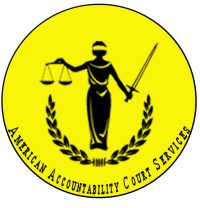
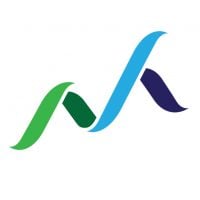
The facility name, logo and brand are the property and registered trademarks of Access Mental Health Agency, and are being used for identification and informational purposes only. Use of these names, logos and brands shall not imply endorsement. RehabNow.org is not affiliated with or sponsored by Access Mental Health Agency.

